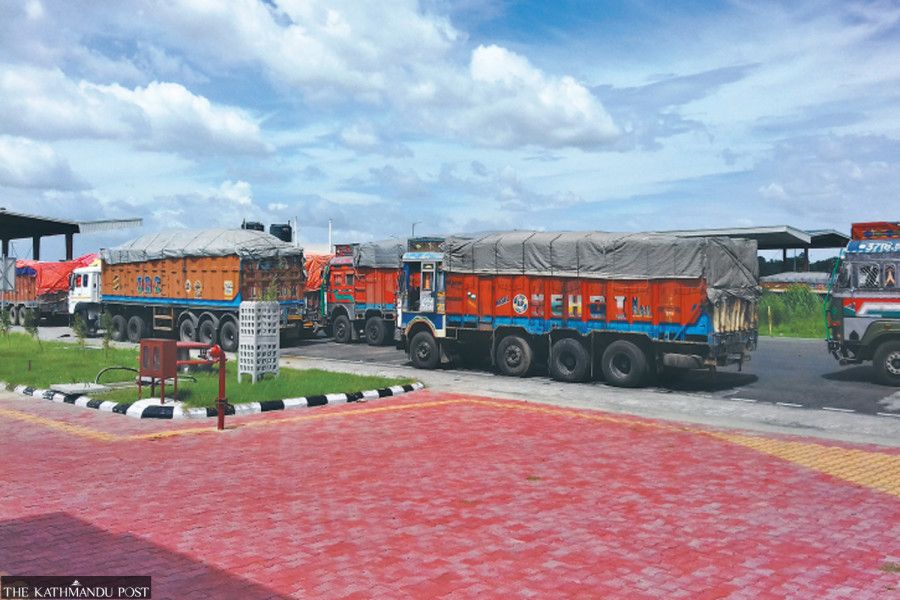Money
LDCs to get interim duty-free and quota-free market access after graduation
Nepal, Bangladesh and Laos will formally come out of the UN-defined least-developed countries category by the end of 2026.
Post Report
During the 13th Ministerial Conference of the World Trade Organisation that concluded in Abu Dhabi of the UAE last Friday, member countries agreed to provide duty-free and quota-free market access for a smooth and sustainable transition period for the countries that are set to graduate from least developed countries (LDCs) category.
Nepal, Bangladesh and the Lao People's Democratic Republic will formally come out of the UN-defined category, LDC, by the end of 2026 and become developing countries.
In October last year, the General Council meeting of the WTO decided to encourage members of the organisation to provide a smooth and sustainable transition period for new LDC graduates before withdrawing the unilateral tariff or duty-free and quota-free market access these countries have been enjoying as LDCs.
More LDCs will follow these countries. There are 45 LDCs, of which 15 are now on the path to graduation to developing countries, and 10 are WTO members. Last December, Bhutan came out of the list.
According to the press statement issued by the Industry Ministry, the conference also agreed to the continuation of capacity enhancement-related assistance for three years after graduating from the LDC list.
An agreement was also reached on adopting a restraint mechanism to address any conflict arising from the graduation, the statement said.
The conference directed that the issues raised by the LDCs for the continuation of the Trade-related Intellectual Property Rights Agreement, Agreement on Agriculture, Agreement on Subsidies and Countervailing Measures, and Agreement on Trade Facilitation after the graduation, be concluded by December 2024.
The conference was concluded by issuing the ‘Abu Dhabi Declaration’.
During the conference, Nepal’s team participated in discussions regarding issues like priorities of LDCs, trade and inclusion, e-commerce, conflict management mechanism of the WTO and trade development and LDC graduation proposal.
The representatives from the Commerce Ministry of Nepal held bilateral trade discussions with the commerce secretaries of China, Austria, Saudi Arabia, Morocco, Bangladesh, India and the US.
The Nepal team also participated in the 12th China Round Table on WTO accession and trade ministerial meeting of land-locked developing countries, the statement said.
According to international media reports, the WTO members agreed to implement Special and Preferential Treatment on Sanitary and Phytosanitary (SPS) measures and Technical Barriers to Trade, which supports producers in least-developed countries to gain better access to global supply chains.
Currently, SPS measures account for 90 percent of non-tariff barriers to trade, which are considered discriminatory to smaller nations.
In another outcome benefiting developing countries, ministers adopted a Ministerial Decision that responds to a 23-year-old mandate to review special and differential treatment provisions for LDCs to make them more precise, effective and operational.
“The decision means that Nepal will get duty-free quota-free market access as it has been enjoying currently for some time even after graduating from the LDC category,” said Purushottam Ojha, former commerce secretary.
LDCs requested the continuation of trade benefits for some period after LDC graduation, he said.
The trade benefits given by the European Union, a generalised system of preferences, flexibility in intellectual property rights, and the price undertaking facility in countervailing measures will be continued even after LDC graduation, Ojha said.
“Overall, the conference was not fruitful as it was a continuation of past negotiations.”
The members agreed to extend the moratorium on customs duties on electronic transmission for another two years, but public stock holding of food remained in discussion only, and they could not conclude the negotiations on agricultural and non-agricultural market access, said Ojha.
It has been many years since the dispute settlement mechanism of the WTO has been defunct, he said. “However, it’s good news that the conference has committed to activating the dispute settlement mechanism by 2024.”
According to the Department of Customs, Nepal’s total trade stood at Rs1.76 trillion in the last fiscal year, ending mid-July 2023. Of the total trade, imports stood at Rs1.61 trillion and exports at Rs157.14 billion, with a trade deficit amounting to Rs1.45 trillion.




 9.12°C Kathmandu
9.12°C Kathmandu













